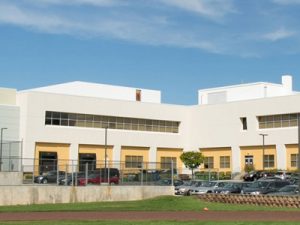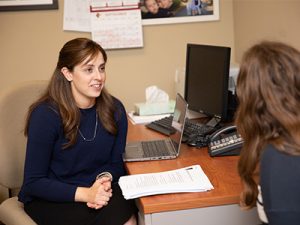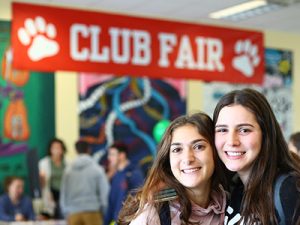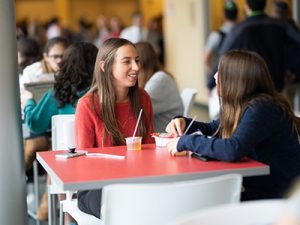Science
Frisch’s comprehensive, lab-based science program enables students to understand themselves and their environment from a scientific perspective. In Biology, Chemistry, Physics, Engineering, and Scientific Research courses, students gain an appreciation for the complexity of the universe and the application of scientific knowledge in their daily lives.
9th Grade
Biology
Freshman year Biology is a survey course that lays the foundation for understanding biology in a conceptual way. Students learn to recognize the unifying themes that pervade all of biology and frame our understanding of the living world. Those central themes include the study of the process of evolution as it drives the unity and diversity of life; the use of energy and molecular building blocks to grow and reproduce; the ability of living things to store, retrieve, and transmit information essential to life, and the interactions of biological systems with each other. During laboratory sessions the students are exposed to science as a process. They gather and analyze data and synthesize concepts from the data they collect.
10th Grade
Chemistry
In our comprehensive, laboratory-based sophomore Chemistry course, students investigate an array of topics including the properties of matter, chemical reactions, stoichiometry, and bonding. Students are encouraged to compare, contrast, and synthesize useful models of the structure and properties of matter and the mechanisms of its interactions. In addition, students gain an understanding of the history of chemistry and investigate chemical questions related to societal issues.
11th Grade
Physics
In the junior year Physics course, students explore the fundamental laws that determine the workings of the universe. Topics include motion, force, gravity, momentum, energy, heat, waves, light, optics, electricity, magnetism, and the structure of the atom. This course focuses on many topics at the forefront of current research and which are relevant to contemporary uses of physics in the home and workplace.
Advanced Science Opportunities
Engineering Track
The two-year Engineering Track challenges students to expand their intellects and develop skills in inquiry, critical thinking, problem solving, research, and presentation. They develop the ability to access and analyze information and see the world through multiple perspectives. The Engineering Track combines the disciplines of science, technology, engineering, and mathematics (STEM).
9th Grade
Principles of Engineering: Foundations of Engineering and Electronics
Students are introduced to the foundations of engineering design as they investigate systems and their classification, function and purpose. They learn problem solving skills, dimension and unit analysis, measurements, calculations, documentation and teamwork. Students then explore the foundations of electronics in the lab including ohms law, voltage dividers, series and parallel circuits. They build and test circuits using electronic components and breadboards and experiment with meters and various sensors.
Foundations of Feedback and Control
Students discover the need for feedback and control in system design. They learn coding by programming the Arduino micro-controller to integrate control and sensors as they design and develop working systems. Students work with variables, loops, analog and digital data types and functions.
10th Grade
Applied Engineering: Bioelectronics
Students work with advanced electronic hardware and meters to build and test working prototypes. They experiment with the oscilloscope, RF transmitters, capacitors, transistors, Op amps, H-bridges, advanced motors, logic gates and biological sensors. Students apply and expand their coding skills to integrate hardware and software using the Arduino micro- controller for feedback and control.
Digital Design & Fabrication
Students get a hands-on introduction to the world of 3-D printing and learn about how 3-D printing has changed the way we design and manufacture. They use CAD software to design and print, as they design custom working parts and integrate them into their final projects.
11th Grade
Computer Science: Topics in Application Development
An in-depth study of Java as a programming language, students learn the basics of Java syntax and object- oriented programming, and cover topics such as the design of graphical user interfaces, working with network communication, and creating multi-threaded applications. The class introduces discrete mathematics, data structures and algorithms, and object-oriented programming design concepts: abstraction, inheritance, and polymorphism. Through this study of foundational topics and their hands-on applications, students develop full proficiency in reading and writing Java code. This course prepares students for the AP Computer Science A exam.
Computer Science Principles and Problems
An introduction to programming and developing applications for the internet using JavaScript and Python, this class also covers topics such as network structure, cybersecurity, TCP/IP protocols, and the web design markup language HTML with CSS. Students pursue independent projects while learning the basics of computer programming: variables, loops, conditionals, and functions. This course prepares students for the AP Computer Science Principles exam.
Basic Robotics
The project-based robotics course covers the fundamentals of robotics, microcontrollers, programming, sensors and actuators. Students use the LEGO Mindstorms NXT kits and RobotC programming language. Students not only build robots with sensor attachments, but also design algorithms to solve problems and write computer programs to implement them. Each project highlights a different challenge using diverse sensors. In addition to programming, the course covers mechanical and structural design, odometry, touch sensors, color and light sensors, ultrasonic sensors, gears and power, motors and other actuators, including some computer architecture.
Advanced Robotics
Building upon knowledge gained from the introductory robotics course, students are presented with specific problems that they have to design their own robots to solve. Students work on project challenges such as a robot that must find the exact center when placed in a bounded circle, a “rescue robot” that must travel through corridors in a simulated building and rescue inhabitants without touching any walls, a robot to pick up and place a small wooden block in a bowl, a gear computer that does arithmetic calculations and displays results, a golf playing robot, a robot that plays music through movement, etc. The class presents an exciting challenge for technically adept students who are looking to expand their knowledge of robotics and computer programming, as well as develop their creative problem solving skills.
Digital Design and Fabrication: Principles of Mechanical Engineering
Mechanical engineers apply engineering, physics, and materials science principles to design, analyze, manufacture, and maintain mechanical systems.
Students learn skills in mechanical engineering, digital design, fabrication, product design and machine assembly. They apply the skills acquired in engineering I & II with design and fabrication in the makerspace.
Students create working systems that incorporate components they design, using 3D and 2D technologies of Fusion360®, Adobe Illustrator®, and other CAD software platforms. They fabricate parts with laser cutters, a suite of 3D printers, milling machines, and other high tech equipment and tools. Students design with precision measuring skills and incorporate electronic components to control their designs. This course is project-based and assessed with project rubrics.
Bio Research: Waksman Student Scholars Program (with departmental approval)
Frisch students have the opportunity to participate in authentic research in the fields of genomics and bioinformatics under the support and guidance of Rutgers University. This exciting hands-on elective allows students to apply their previous study of science to cutting-edge DNA research. In this full-year Junior elective, students are given a subset of a cDNA library of the genome of the plant Landoltia punctata, commonly known as duckweed. Students proceed to purify clones containing specific gene sequences, amplify the DNA using polymerase chain reaction (PCR), and perform restriction digests on these clones. Gel electrophoresis is used to identify the size of the gene inserts. Once the DNA sequences have been determined, students analyze the DNA sequences using bioinformatics. Students become familiar with BLAST, Basic Local Alignment Search Tool that compares this novel gene sequence to both DNA sequences and proteins sequences available on the national databases of the National Center of Bioinformatics (NCBI). The goal of the research is to identify novel proteins in Landoltia. Students’ analysis is then submitted to NCBI for publication on their databases, which is then made available to all researchers worldwide.
Science Research Initiative
The advanced science research course affords students the opportunity to participate in the community of scientific research and scholarship as part of their high school experience. During the school year, students have the opportunity to choose and explore a topic of interest. The topic may come from mathematics, physical science, computer science, engineering, life science, social science, or psychology. This is in preparation to match the student to a research lab within the area for a summer internship. Students who sign up for this course have to be willing to commit to working in a lab for 5-7 consecutive weeks over the summer. During the school year, the students meet once a week to develop research skills by conducting on-line bibliographic searches of international databases of scientific journals. Students’ presentations convey current scholarship to their classmates and prepare them to engage in original research in a laboratory setting under the guidance of their scientist mentor and teacher. Students are required to write a research paper at the end of their internship which can be submitted to various science competitions during the fall of their senior year, including the Intel Science Talent Search.
12th Grade
Introductory College Level Biology (Honors)
The intent of the biology course is to expose students to higher-level biological principles, concepts, and skills and allow them the opportunity to apply their knowledge to real-life applications. Students are expected to learn not by memorization of facts, but through content and concept application. Core concepts and their application are the basis of the curriculum and are organized around biological principles that focus on evolution, the use of biological systems using energy to maintain homeostasis for survival, passing heritable information to provide continuity of life,and the interaction of biological systems with biotic and abiotic factors. Students in this course are prepared for the Advanced Placement Biology exam.
Advanced Chemical Principles – A Quest for Inquiry (Honors)
The goal of the chemistry course is to provide students with the conceptual framework, factual knowledge, and analytical skills necessary to deal critically with the rapidly changing science of chemistry. The curriculum is built upon rigorous study in four major areas: structure of matter, states of matter, reaction, and descriptive chemistry. Laboratory work supplements this course.
Students are prepared for the Advanced Placement Chemistry exam.
Physics for Scientists and Engineers (Honors)
Students interested in science and engineering learn how to apply differential and integral calculus to problem solving in mechanics and electricity and magnetism in this calculus-based general physics class. Concurrent enrollment in calculus is a requirement and supplemental weekly labs cover topics in electricity and magnetism as well as optics and modern physics. Students are expected to complete lab reports with mathematical analyses of their data done in graphical analysis software, as well as to investigate numerical methods and quantitative data analysis in great depth using scientific software.
Environmental Science–Modeling/Analyzing the Interrelationships of the Natural World (Honors)
Students explore the interrelationships of the natural world and are introduced to the scientific principles, concepts, and methodologies needed to understand both natural and human-made environmental problems and to examine possible solutions. Topics include earth systems, ecosystems, population dynamics, land and water use, energy resources and consumption, pollution, and global change.
Anatomy and Physiology
Anatomy and Physiology is a laboratory-based course that investigates the structure and function of the human body. This course is designed for those students who have taken biology and who wish to further their study of the human body in preparation for advanced biological studies in college, both for the allied health fields and other science-based careers. Laboratory experiences include dissections and text-based activities on the following topics: the structure and function of the various cells, tissues, and integrated systems of the body; the major body systems; how the body systems work together to provide homeostasis; and body functions in healthy and diseased states.
Environmental Impacts on Healthy Living
Students engage in an in-depth study of the human body and how society impacts different health issues. The course begins with an introduction in which students consider how society and government, in general, can impact research and how this may affect our health.
The course is divided into several units which cover the anatomy of systems, as well as scientific research which analyzes how different environmental factors may impact the health of that system. Topics include digestion, circulation, respiration and others. The final unit of the course explores the history of ethics involved in human experimentation.
Torah, Science and Engineering
Merging Halachic Judaism with Modern Life
Students learn Hilchot Shabbat including the laws of boneh, gerama and milechet machshevet and explore the halachic implications and how they manifest in modern life. Students are exposed to the Zomet Institute and its current research, innovations and discussions that have led to high-tech developments. After developing an understanding of how halacha responds to technological developments, students utilize this knowledge to design their own capstone engineering project which solves a real world problem by merging halacha with modern life. Projects include a research component in which students discuss the various halachic approaches relevant to their topic, as well as a design element for students to create a working prototype of their solution.
TOM – Tikun Olam Makers
Students learn halachot which are bein adam l’chavaro, their sources and implications through textual study.
Frisch partners with TOM [Tikun Olam Makers], a global movement of communities connecting makers, designers, developers and engineers with people with disabilities and Friendship Circle families to develop technological solutions for everyday challenges.





